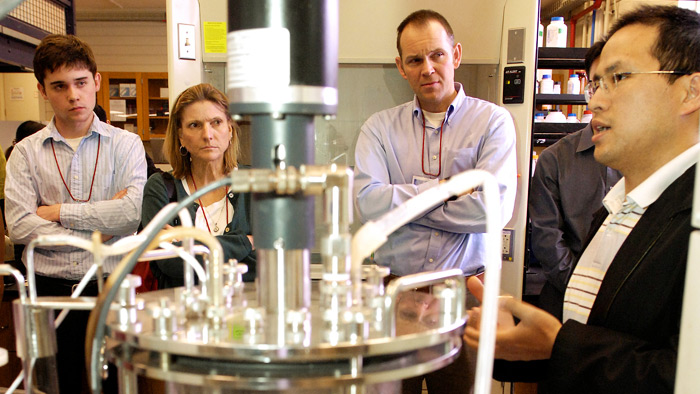NARA Brings New Component to Competition
The Imagine Tomorrow competition lets students dream big and think that about how they might solve our world’s energy problems. For some, it provides a first-ever chance to step on a college campus.
The competition has encouraged thousands of Washington teenagers to imagine a better energy future for their generation while they imagine a brighter academic future for themselves.
Support from the Northwest Advanced Renewables Alliance (NARA) will now bring a similar opportunity to high school students from Idaho, Oregon, and Montana. It will also add Biofuels to the menu of challenges that Imagine Tomorrow contestants may address. Other challenges—Behavior, Design, and Technology—ask students to consider energy problems from the perspective of different disciplines.
“We want to emphasize to these students that biofuels are going to be an important part of solving the sustainable energy challenge, especially in the Northwest,”—David Bahr
“The students who participate learn about being active in solving problems, rather than passive.” says David Bahr, who is coordinating the expansion effort for the program.
Washington State University began Imagine Tomorrow as an effort by to engage Washington students to work on big societal challenges. Since starting in 2008, the program has grown each year and has remained focused on energy.
“The NARA grant provides a wonderful opportunity that we didn’t have before to expand a very valuable program,” he says. “This competition makes a difference in students’ lives.”
The competition, held each spring on the WSU campus, asks students to choose and address one of four open-ended challenges. Topics span all subjects—not just the sciences. Imagine Tomorrow has attracted a broader cross-section of students than the traditional science fair, including more young women, students from a variety of economic backgrounds, and students from both urban and rural areas. Unlike most science fairs, Imagine Tomorrow requires students to work in teams.

The program has been truly life changing for many of the students, says Bahr. It has inspired many to attend college, has motivated at-risk students to take part in high school activities, has spawned girls’ interest in science and engineering disciplines, and has engaged students to enact positive change in their communities.
“Many of these students have never been to a college campus before and thought college was something that other people did,” said Bahr. “After coming to campus and participating in the competition, we find that they suddenly can imagine going to college.
“It is clearly an eye-opening experience.”
The researchers hope to double the number of participants in the highly successful program in a new category that specifically features biofuels.
“We want to emphasize to these students that biofuels are going to be an important part of solving the sustainable energy challenge, especially in the Northwest,” says Bahr. “I’m looking forward to seeing the great ideas that they come up with.”
The NARA involvement in the Imagine Tomorrow competition is part of the project’s education initiatives, which span from kindergarten through graduate school. The education group aims to:
- Meet the workforce needs of the bio-energy/bioproducts economy
- Develop a broad, integrated view of the biofuels problem among emerging scientists and engineers
- Enhance communication skills of scientists and engineers so that they can better engage society in their work
- Develop the next generation of energy leaders for industry, government, and the civic sector
- Improve the biofuels literacy of teachers educating our future citizens
- Strengthen the overall science literacy of these same young citizens in areas particular to the biofuels debate.
QUOTABLE
“Our world is facing an energy crisis, and I think students kind of offer a lot of innovation and ideas for the future…. We’re the ones who are going to be the future, and so I think that our ideas can spark huge change and offer new ideas to save our planet.”
—Carly Marshall
Freshman, Camas High School“The biggest thing that I’ve learned is to stay practical about what you want to do. Obviously I want to save the world, change the world, but I can only do so much.”
—Adam Gefkovicz
Sophomore, Mt. Rainer High School“It’s just so exciting to see students that believe in the future, that are interacting with one another. They’re learning these teaming skills. It’s just fantastic.”
—George Roe
Competition judge and senior manager in energy management at Boeing
“At least three or four ideas need to have patent disclosures written on them, and four or five (groups) need to write scientific papers.”
—Jim Coogan
Associate technical fellow with The Boeing Company and a competition judge“This is not a science fair, this is a problem-solving fair,”
—Miles Drake
Senior vice president of research and development at Weyerhaeuser